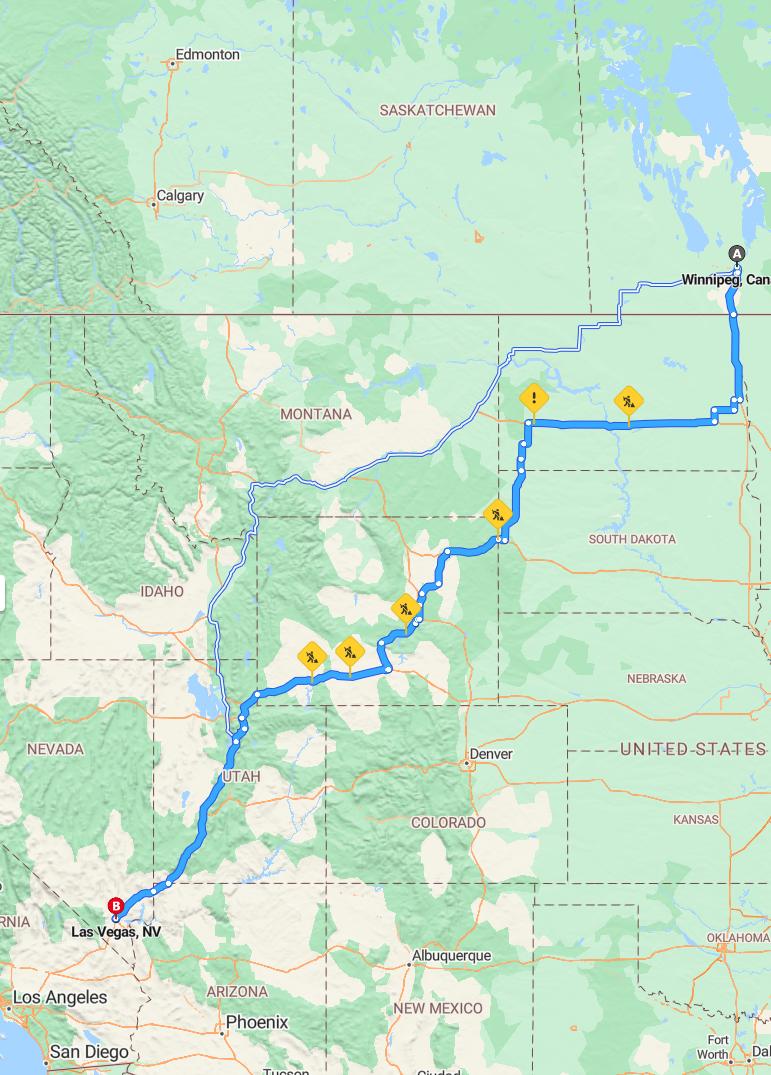Distance and estimated driving time
A road trip from Winnipeg to Las Vegas covers approximately 1,712 miles and takes around 24 hours and 42 minutes. The journey primarily follows the I-80 West and I-15 South, offering a scenic cross-country route through the United States. Planning ahead for rest stops and fuel is essential to ensure a smooth drive across multiple states. This extensive drive provides an opportunity to experience diverse landscapes and landmarks along the way.
Driving route
Embarking on a road trip from Winnipeg, Canada to Las Vegas, Nevada, offers a diverse and scenic journey through the heart of North America. Starting in Winnipeg, travelers traverse through the vast landscapes of Montana, renowned for its rugged mountains and expansive plains. Continuing westward, Idaho greets drivers with its lush forests and picturesque lakes, providing a refreshing escape into nature. The route then enters Utah, known for its stunning national parks and unique geological formations, before reaching Nevada, the final stretch leading to the vibrant city of Las Vegas. This cross-country adventure combines cultural landmarks, breathtaking scenery, and the thrill of exploration across multiple states and regions.

Best rest stops along the route
Traveling from Winnipeg to Las Vegas offers numerous rest stops to ensure a comfortable journey. In Montana, travelers can pause at major highway rest areas such as the Townsend Rest Area or the Missoula Rest Area, which provide clean facilities and scenic views. As you pass through Idaho, the Snake River Stop and rest areas near Twin Falls are excellent for a quick break and refreshments. In Utah, the Cove Fort Historic Site Rest Area offers both rest facilities and a glimpse into local history, while Nevada features well-maintained stops like the Mesquite Travel Center, which offers amenities for weary travelers. These strategically located rest stops enhance the road trip by providing opportunities to relax, refuel, and enjoy the changing landscapes.
Recommended overnight accommodations
When driving from Winnipeg to Las Vegas, it's important to plan for comfortable overnight accommodations along the route. In Montana, consider staying in Billings or Missoula, both offering a range of hotels suitable for travelers. As you pass through Idaho, Boise and Twin Falls provide convenient options with comfortable amenities. Finally, in Utah, Salt Lake City is an ideal stop, while in Nevada, Las Vegas itself offers numerous hotel choices to suit every preference, ensuring a restful night before reaching your final destination.
Scenic attractions to visit en route
Traveling from Winnipeg to Las Vegas offers an array of breathtaking scenic attractions. In Montana, you can explore Glacier National Park's stunning glaciers and rugged mountains, ideal for outdoor enthusiasts. Idaho features the awe-inspiring Shoshone Falls, often called the "Niagara of the West," providing spectacular sightlines. As you enter Utah, the vibrant rock formations and arches of Zion National Park present unforgettable landscapes, culminating in the lively entertainment and desert beauty of Las Vegas, Nevada.
Weather conditions and travel tips
Traveling from Winnipeg to Las Vegas offers diverse weather conditions, with potentially cold temperatures and snow in Montana and Idaho during winter months, requiring travelers to prepare for icy roads and winter driving conditions. As you move south into Utah and Nevada, the climate generally becomes milder, although summer temperatures in Nevada and Las Vegas can soar, so carrying plenty of water and sun protection is essential. It's advisable to check current weather forecasts along your route regularly and to be aware of any road closures or hazardous conditions, especially in mountainous areas. Additionally, ensuring your vehicle is well-maintained, carrying emergency supplies, and planning your stops can help ensure a safe and smooth journey through varying climates and terrains.
Vehicle preparation and maintenance tips
Before embarking on a long road trip from Winnipeg to Las Vegas, it is essential to ensure your vehicle is properly prepared and maintained. Conduct a thorough inspection of tires, making sure they are properly inflated and have adequate tread for diverse road conditions. Check all fluid levels, including oil, coolant, brake fluid, and windshield washer fluid, and top them up as needed. Additionally, inspect the brakes, lights, and belts, and consider scheduling a maintenance check-up to prevent unexpected breakdowns during your journey.
Food and dining options along the way
Traveling from Winnipeg to Las Vegas offers a diverse array of food and dining experiences along the route. In Montana and Idaho, travelers can enjoy hearty Western cuisine, featuring local specialties like Bison burgers and fresh farm produce. Utah provides a variety of options, from family-friendly diners to gourmet restaurants serving southwestern and Mormon cuisine. Upon reaching Nevada and Las Vegas, visitors are spoiled for choice with world-renowned fine dining, innovative buffets, and vibrant nightlife venues, ensuring a memorable culinary journey throughout the trip.
Important travel regulations and toll information
When traveling from Winnipeg to Las Vegas by car, it's important to be aware of different travel regulations across the states and provinces. In Canada and the United States, travelers should carry valid identification such as passports, especially when crossing international borders. Additionally, some states like Idaho and Utah use toll roads, so carrying an electronic toll pass or cash is recommended to facilitate seamless travel. At the border, law enforcement may conduct inspections, and adherence to local traffic laws, including speed limits and seatbelt requirements, is essential for a smooth journey.
Safety precautions for long-distance driving
Embarking on a long-distance road trip from Winnipeg to Las Vegas requires careful safety precautions to ensure a smooth journey. Before departure, conduct a thorough vehicle inspection, including tire pressure, fluid levels, and brakes, to prevent breakdowns. During the drive, take regular breaks to rest and stay alert, minimizing fatigue and reducing the risk of accidents. Additionally, keep emergency supplies such as water, first aid kits, and a fully charged phone handy, and adhere to traffic laws across different states and provinces to ensure a safe and enjoyable trip.
